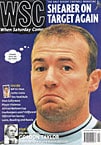 Neil Dixe Wills discovers the life and times of Jimmy Seed, through his classic autobiography
Neil Dixe Wills discovers the life and times of Jimmy Seed, through his classic autobiography
“Eventually there will be a soccer League of Nations with clubs flying off to South America in little more time than it would take Newcastle to travel to Plymouth by train. These days may not be realised in my time, but they are coming.” Meet Jimmy Seed: child soldier, double title-winner, leviathan of The Valley and, judging by the statement above, pretty useful soothsayer.
Seed’s is a story forever teetering on the brink of caricature: early teens down t’pit, the inevitably failed first trial with Sunderland and the return, Boy’s Own style, to score a hat-trick and book his ticket out of the mines in April 1914. Bad timing all round, really. Football stopped soon afterwards and the war dragged on sufficiently for Jimmy to become old enough to join the Cyclist Corps. He was duly gassed and sent home. To add insult to injury, when he reported back at Roker Park he discovered that he’d been offloaded to non-League Mid-Rhondda.
That’s about as bad as it ever got. From Wales he went to Tottenham, winning the 1921 FA Cup. Six years later Spurs sold him to Sheffield Wednesday because he refused a £1 per week pay cut.
Such a transfer sounds innocuous enough but I defy anyone to come up with a more cataclysmic sale in all of history. With ten matches remaining, Wednesday were seven points adrift at the foot of the First Division. New signing Seed was appointed captain. They collected 17 points out of 20 (including four off Spurs – Jimmy scoring in both games, naturally) and finished 14th. Seed led them to the championship the next season. Oh, and the season after that. Spurs, on the other hand, plummeted from seventh before Easter and were relegated. They spent the next five years in the Second Division. Whoops.
Success mercilessly dogged Seed when he moved from the pitch to the dug-out. He spent 23 years as secretary-manager of Charlton, taking them from the Third Division to the First, was pipped for the championship the next season and then kept them in the First Division despite having to make a profit on player transfers every year. There was also the matter of back-to-back FA Cup final appearances (oddly enough, the two “bursting ball” finals), winning the latter one. Seed was a Dave Bassett long before the phrase “doing a Wimbledon” ever troubled our lexicon. The Dons connection doesn’t end there. The Charlton owners, as a tax dodge, wanted to move the club permanently to South Africa. Makes Dublin seem quite sane by comparison.
As in much of life, the real fascination with The Jimmy Seed Story comes from what it doesn’t tell you. His entire wartime service merits just one paragraph. More intriguing still, his England appearances are afforded a mere four words: “…my playing career with Sunderland, Mid-Rhondda, Spurs, Sheffield Wednesday and, of course, England.” It does make you wonder just how bad it can have been to justify reducing the experience to a conjunction, an adverbial phrase and a proper noun.
However, one story he does deign to narrate is that of Charlton’s hilarious-if-it-didn’t-happen-to-you South American tour. On arrival in Colombia their passports were taken from them by their hosts, club side Millonarios. They were then held captive and told which teams they would have to play before they were allowed home. They subsequently fetched up in Peru and Ecuador, and took part in a mass brawl with Argentine players which was only broken up when armed troops stormed the pitch. With exemplary understatement, Seed concludes that after that he preferred close-season tours to Sweden.
The promotions aside, the book makes for heart-rending reading for Charlton fans. Seed’s book is full of the greatness that might have been theirs. To say that, but for a poor decision in the boardroom and the rise of the motorised bus, they could have emulated Arsenal is no idle speculation. In 1932, the Gliksten brothers planned to make Charlton the most glamorous club in England and increase the capacity of The Valley to a gob-smacking 200,000. Then they fatally baulked at the pittance required to bring Stanley Matthews to the capital. The decline of the tram helped kill off big gates at Charlton and from then on they became a selling club.
Seed claims that even in the years before and after the Second World War “the cheque book ruled football” and that corruption or attempted corruption was rife. However, the overwhelming scent that rises from the now delicately sepia-ed pages is that of an innocence long since banished from the game. The book teems with brims of trilbies, half-back lines consisting of Joblings, Pugsleys and Biswells, and presentations of handsome pen-and-pencil sets. Call me a hopeless romantic if you like but, somehow, I prefer that.
From WSC 158 April 2000. What was happening this month